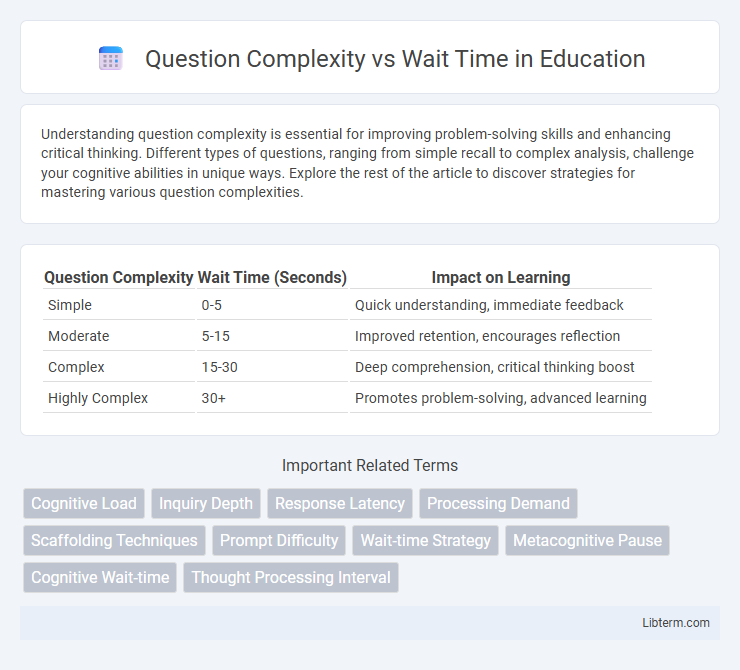Understanding question complexity is essential for improving problem-solving skills and enhancing critical thinking. Different types of questions, ranging from simple recall to complex analysis, challenge your cognitive abilities in unique ways. Explore the rest of the article to discover strategies for mastering various question complexities.
Table of Comparison
| Question Complexity | Wait Time (Seconds) | Impact on Learning |
|---|---|---|
| Simple | 0-5 | Quick understanding, immediate feedback |
| Moderate | 5-15 | Improved retention, encourages reflection |
| Complex | 15-30 | Deep comprehension, critical thinking boost |
| Highly Complex | 30+ | Promotes problem-solving, advanced learning |
Introduction to Question Complexity and Wait Time
Question complexity directly influences wait time, with more intricate inquiries requiring longer processing durations due to the need for detailed analysis and retrieval of relevant information. Simple questions involving straightforward facts or definitions typically incur minimal wait time, enhancing user experience through rapid responses. Understanding the relationship between question complexity and wait time enables optimization of response systems by balancing depth of answer and speed.
Defining Question Complexity in Customer Interactions
Question complexity in customer interactions is defined by factors such as the number of variables involved, the need for detailed explanation, and the specificity of the inquiry. High-complexity questions typically require deeper analysis, cross-referencing multiple information sources, and longer resolution times. Understanding these complexity levels helps optimize wait time management and improve overall customer satisfaction.
Understanding Wait Time: Causes and Consequences
Understanding wait time involves analyzing factors such as question complexity, available resources, and user demand. Higher question complexity typically requires more time for processing, resulting in longer wait periods and potential customer dissatisfaction. Extended wait times can decrease efficiency and negatively impact user experience, highlighting the need for optimized response strategies.
How Complex Questions Impact Response Times
Complex questions demand more cognitive processing and data analysis, significantly increasing response times in both human and AI interactions. The depth of information required and the necessity to integrate multiple data points prolong the time needed to generate accurate and comprehensive answers. Consequently, systems with limited processing capabilities or databases may experience notable delays when handling high-complexity queries.
The Correlation Between Query Depth and Wait Time
Query depth significantly impacts wait time, as more complex questions require advanced data retrieval and processing, increasing response latency. Deep semantic queries often involve multiple database joins or API calls, further extending wait durations. Efficient optimization techniques and indexing can mitigate the correlation between query complexity and wait time.
Factors Influencing Question Complexity
Question complexity is influenced by factors such as the depth of subject knowledge required, the specificity of the query, and the ambiguity inherent in the question's wording. Complex questions often demand detailed explanations, cross-referencing multiple data sources, or advanced problem-solving techniques, leading to longer processing times. Variability in user expertise, context intricacy, and the need for precise information retrieval further contribute to increased wait time before a response can be generated.
Strategies to Reduce Wait Time for Complex Inquiries
Implementing AI-driven chatbots and machine learning algorithms can efficiently triage complex inquiries, reducing wait time by directing users to targeted support resources. Providing comprehensive self-service portals enriched with detailed FAQs and video tutorials empowers customers to resolve intricate issues independently and quickly. Integrating real-time data analytics allows support teams to predict peak inquiry times and optimize staffing, ensuring rapid response for complex questions.
Leveraging Technology to Handle Complex Questions
Advanced AI-driven chatbots and natural language processing algorithms significantly reduce wait times by efficiently handling complex questions through real-time analysis. Implementing machine learning models enables the system to understand nuanced queries, predict user intent, and provide accurate responses without human intervention. Integrating these technologies improves customer satisfaction by ensuring timely and precise support for intricate inquiries.
Measuring and Analyzing Wait Time for Diverse Queries
Measuring and analyzing wait time for diverse queries involves categorizing questions by complexity levels, such as factual, conceptual, or analytical types, and tracking response latency accordingly. Data-driven approaches use metrics like average response time, median latency, and standard deviations to identify performance bottlenecks across query complexities. Advanced analytics incorporate machine learning models to predict wait times based on query semantics, enabling optimization of resource allocation and improved response efficiency.
Best Practices for Balancing Question Complexity and Waiting Periods
Optimizing question complexity and wait time requires implementing clear guidelines that match question difficulty with appropriate response windows, ensuring timely and accurate answers. Utilizing tiered support systems and automated triage tools helps prioritize complex inquiries while minimizing unnecessary delays for simpler questions. Consistent monitoring of response metrics and user feedback enables continuous adjustment of wait times to maintain satisfaction and efficiency in service delivery.
Question Complexity Infographic

 libterm.com
libterm.com